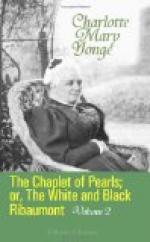How shall it be told what the contents of the packet were? Lord Walwyn reading on with much concern, but little surprise, was nevertheless startled by the fierce shout with which Berenger broke out:
‘A lie! A lie forged in hell!’ And then seizing the parchment, was about to rend it with all the force of passion, when his grandfather, seizing his hand, said, in his calm, authoritative voice, ‘Patience, my poor son.’
’How, how should I have patience when they send me such poisoned lies as these of my wife, and she is in the power of the villains? Grandfather, I must go instantly—–’
‘Let me know what you have heard,’ said Lord Walwyn, holding him feebly indeed, but with all the impressive power and gravity of his years.
‘Falsehoods,’ said Berenger, pushing the whole mass of papers over to him, and then hiding his head between his arms on the table.
Lord Walwyn finished his own letter first. Walsingham wrote with much kind compassion, but quite decisively. He had no doubt that the Ribaumont family had acted as one wheel in the great plot that had destroyed all the heads of Protestant families and swept away among others, as they had hoped, the only scion of the rival house. The old Chevalier de Ribaumont had, he said, begun by expressing sorrow for the mischance that had exposed his brave young cousin to be lost in the general catastrophe, and he had professed proportionate satisfaction on hearing of the young man’s safety. But the Ambassador believed him to have been privy to his son’s designs; and whether Mdlle. de Nid de Merle herself had been a willing agent or not, she certainly had remained in the hands of the family. The decree annulling the marriage had been published, the lady was in a convent in Anjou, and Narcisse de Ribaumont had just been permitted to assume the title of Marquis de Nid de Merle, and was gone into Anjou to espouse her. Sir Francis added a message of commiseration for the young Baron, but could not help congratulating his old friend on having his grandson safe and free from these inconvenient ties.
Berenger’s own packet contained, in the first place, a copy of the cassation of the marriage, on the ground of its having been contracted when the parties were of too tender age to give their legal consent, and its having been unsatisfied since they had reached ecclesiastical years for lawful contraction of wedlock.
The second was one of the old Chevalier’s polite productions. He was perfectly able to ignore Berenger’s revocation of his application for the separation, since the first letter had remained unanswered, and the King’s peremptory commands had prevented Berenger from taking any open measures after his return from Montpipeau. Thus the old gentleman, after expressing due rejoicing at his dear young cousin’s recovery, and regret at the unfortunate mischance that had led to his confounded with the many suspected Huguenots, proceeded as if matters stood




